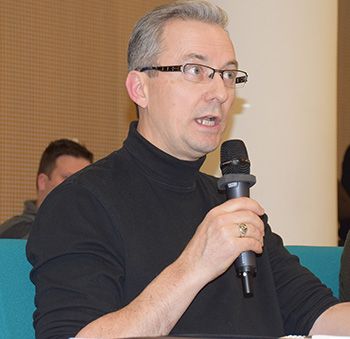"Past is Present" in Action: Larry Mikulcik

The community of Strasbourg, Saskatchewan, has reaped the benefits of Larry Mikulcik’s trip to Poland for Auschwitz: The Past is Present.
Mikulcik teaches history and English language arts at William Derby School, and ever since he returned from Poland, he has been busy presenting what he learned to a wide variety of audiences. In a school assembly, he showed pictures from the trip and explained what he did there. He also led a one-day Holocaust Symposium, where over 300 students and teachers from his school division were invited to spend the day learning about the Holocaust and to learn some of the lessons Mikulcik and the other teachers learned while in Poland.
Mikulcik said many students and teachers were “overwhelmed” by the testimony clips and video footage of the commemoration ceremony at Birkenau that he showed during the presentations. The sheer scale of the Holocaust is astounding to the students.
“The students also are impacted by the determination of the survivors to make sure that we do not forget,” Mikulcik said. “The students also note that though survivors each have a different experience, their reactions are all very similar which speaks to the tremendous impact of such horrific events.”
He also gave two community presentations about Past is Present and the Holocaust, and was surprised that there was so much interest in these topics from the general public. Mikulcik believes that in addition to having a greater concern for human rights in general, the public is interested in learning not just the facts of the Holocaust, but also the personal experiences of survivors and the lessons to be learned. The public’s real “thirst for knowledge” was one of his most unexpected outcomes of the trip.
Mikulcik has also incorporated testimony into his history and English language arts classes – a big change from his lessons before Past is Present, since he was limited to written materials. He has found that IWitness gives students an emotional, personal connection to the Holocaust through the testimonies of survivors, and it “connects students directly to the past and the lessons we need to learn.”
One of his biggest takeaways from Poland was the importance of letting survivors speak for themselves. The lessons that students and even teachers can learn from survivors are especially meaningful and illuminating. Meeting survivors in Poland humbled and inspired him to develop more effective Holocaust pedagogy, he said.
“The APIP experience is teaching me to continue to pursue knowledge and to seek the testimonies of our survivors as that is where the most is learned,” he said.